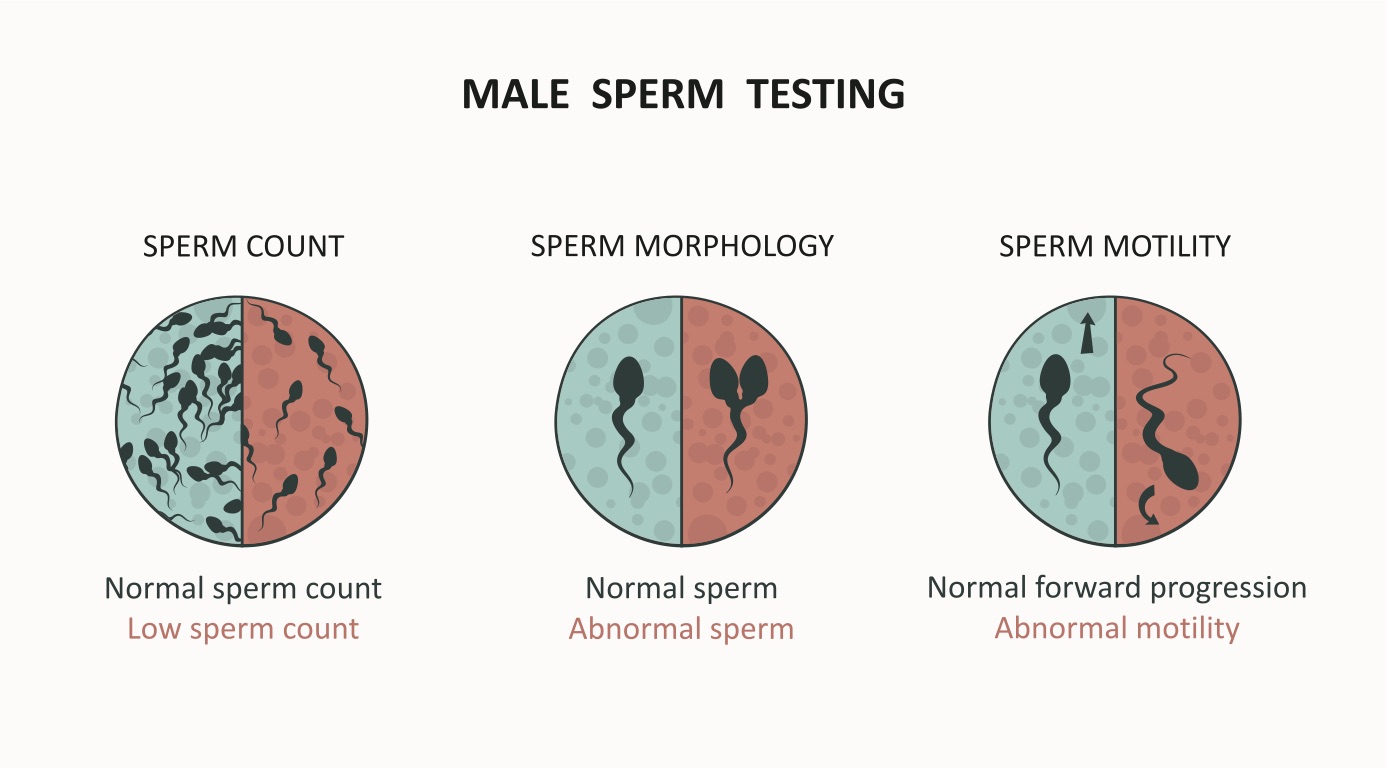29 Nov Male Fertility for Movember
Movember is the perfect opportunity to address male fertility. Male fertility is an important topic related to men’s health and it is often an undervalued factor in determining a couple’s chance at conceiving a baby. Although women are the ones to become pregnant and carry the baby to term, male sperm plays a huge role in achieving a successful pregnancy and a healthy baby. Approximately 1 in 6 couples struggle with infertility and male infertility accounts for about 40% of these fertility concerns. Let’s do a better job of including men in the fertility equation and supporting their health too!
Male Infertility Assessment
Infertility is defined as the inability to conceive after 12 months of unprotected intercourse. It is then recommended that couples consider pursuing further fertility support and testing. For men, the process will start with a medical doctor conducting a proper clinical assessment and a semen analysis.
The clinical assessment will look at whether there is anything in the medical history that points towards a cause of infertility, including assessing for congenital or genetic abnormalities, sexually transmitted infections, exposure to toxic environmental chemicals, drug use, or other medical conditions associated with infertility. Unfortunately, a lot of male infertility cases are unexplained.
Whether the cause is explained or not, a semen analysis will then be performed to give us valuable information about whether any of the sperm parameters are abnormal and affecting fertility. The semen analysis looks at sperm count, motility, morphology, and more. Getting this specific information about the health of your sperm will then help us develop a treatment plan that targets the specific sperm parameters that are less than optimal.
Medical Treatment Options
The most commonly recommended treatment options for male (and female) infertility are assisted reproductive therapies (ART). ART options include intrauterine insemination (IUI), in-vitro fertilization (IVF), and/or intracytoplasmic sperm injection (ICSI). Thankfully, there is more and more research coming out that shows the value of using natural therapies to address sperm parameters. Some medical doctors will recommend these options first. The best way to safely use natural therapies to support male fertility is to work with a naturopathic doctor. We are properly trained in the safety and efficacy of using vitamins, minerals, herbs, and other natural treatment options for male fertility.
Naturopathic Treatment Options
Naturopathic treatment options can be used as a first step before ART or in combination with ART. We will look at environmental factors, lifestyle factors and nutrition, as well as consider additional nutritional supplementation, botanical medicine, and acupuncture.
Environmental Factors:
There are a variety of environmental factors that can affect sperm parameters that are modifiable with the right support. Important environmental factors to consider include exposure to endocrine disrupting chemicals, alcohol, marijuana, and cigarettes. I can help you make the necessary lifestyle changes to reduce your exposure to these factors.
Lifestyle Factors:
It’s also essential that we address lifestyle factors that could be affecting your fertility. Obesity, high stress levels, and poor sleep are key contributors to consider (for both men and women!). Luckily, naturopathic doctors have a large tool kit of treatment options that can improve your sleep, stress, and overall health. I have discussed some of these factors in other blog posts I’ve written, such as Sleep Easy September and Adrenal Love August. Check out this information and then reach out to me if you’d like support implementing the diet and lifestyle changes.
Dietary Factors:
A healthy fertility diet consists of focusing on whole foods while avoiding highly processed foods. Aim to fill your diet with a variety of fruits and vegetables, whole grains, fish, poultry, legumes, nuts, and seeds. It’s also best if you can minimize alcohol and caffeine intake. Ideally, follow the healthy plate model shown here.
Nutritional Supplementation:
In terms of specific nutrients to focus on for male fertility and improving sperm parameters, antioxidants are your best friend! Sperm is very susceptible to damage from reactive oxygen species (ROS). Antioxidants are required in the semen to inactive ROS and prevent damage to the sperm. It’s important to make sure you are getting enough antioxidants in your diet, including vitamin C, vitamin E, selenium, NAC, zinc, and CoQ10. If you’ve had a semen analysis showing abnormal sperm parameters, it will likely be recommended that you start an antioxidant supplement to help correct those parameters. Talk to your naturopathic doctor about therapeutic and safe dosing for the above listed antioxidants.
The other nutrient that is important to focus on in your diet or in supplemental form for sperm health is omega 3 fatty acids. Fish (or fish oil) is the best source but you can also get omega 3 fatty acids from walnuts, flax seeds, chia seeds, and vegan fish oil alternatives. Omega 3 fatty acids are important for sperm maturation and motility.
Botanical Medicine:
If there’s a clear stress component or a possible hormonal imbalance (such as low testosterone), there are great herbs that can be used to address these concerns. A few of the botanicals that can be used to support male fertility by improving libido, reducing stress, and supporting hormone balance include Panax ginseng, Withania somnifera (ashwagandha), and Tribulus terrestris.
Acupuncture:
Yes, acupuncture can be beneficial for male fertility too! Acupuncture is commonly recommended for women to regulate hormones and improve IVF success rates, but it can be great for improving sperm parameters too. Plus, it has the benefit of generally improving circulation, reducing inflammation, relieving stress, and stimulating the body’s natural healing abilities.
Preconception Care
I often see women seeking preconception care and I want to see men involved in this process too! Instead of waiting until after 12 months, let’s start right away with addressing the factors listed above. Sperm takes approximately 3 months to mature in the body. Therefore, we ideally want to begin a preconception care plan 3 months prior to when you start trying to conceive.
As part of a preconception care plan for men, we will look at environmental and lifestyle factors that might impact fertility and make an action plan to reduce them. We will also look at your current nutrition and discuss how to optimize it to ensure you’re getting all the necessary nutrients for improving fertility. We can also discuss if a prenatal vitamin or antioxidant support is warranted based on your history and environmental exposures.






